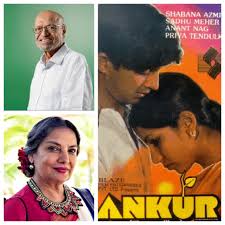
What Bollywood say
Manoj Bajpayee: “Had the privilege of working with him in Zubeidaa!! What a story teller what a mind!! Always smiling and telling stories about cinema, literature and society!! We will keep celebrating you and your cinema sir!!”
Nandita Das: “Beyond sad to hear about Shyam Benegal’s passing. He has been such an important part of my growing up years – first as a film viewer, then as an actor and director.”
Farhan Akhtar: “Deepest condolences to the family and loved ones of Shyam Benegal ji.. his passing away truly marks the end of a glorious chapter in Indian cinema.”
Anupam Kher: “The end of an era! The doyen of Indian Parallel cinema, Shyam Benegal ji leaves behind a rich legacy of movies which will continue to inspire generations.”
Madhur Bhandarkar: “Deeply saddened to hear about the demise of Legendary Filmmaker Shyam Benegal Ji. His contribution to Indian Cinema is truly remarkable.”
This is deeply saddening news. Shyam Benegal’s passing marks the end of an era in Indian cinema. His contributions to Indian film were truly revolutionary, particularly in establishing parallel cinema as a powerful medium for social commentary and artistic expression.
Your report mentions that he turned 90 just ten days ago, on December 14th. It’s touching to know that despite his health challenges, including requiring regular dialysis, he remained dedicated to his craft until the end.
His remarkable filmography, beginning with “Ankur” in 1973, helped create a new cinematic language in India. The fact that “Nishant” competed at Cannes in 1976 for the Palme d’Or demonstrates how his work resonated internationally. His films were distinguished by their social consciousness and artistic integrity, prioritizing storytelling over commercial success.
His impressive list of honors – the Padma Shri, Padma Bhushan, and the prestigious Dadasaheb Phalke Award, along with seven National Film Awards for Best Feature Film in Hindi – reflects his enormous impact on Indian cinema. The V Shantaram Lifetime Achievement Award in 2018 was a fitting tribute to his enduring influence.
My condolences to his wife Nira Benegal, daughter Pia Benegal, and the entire Indian film community. His legacy will continue to inspire generations of filmmakers who believe in the power of cinema to drive social change and artistic innovation.
Let me share some of Shyam Benegal’s most significant and acclaimed films:
Landmark Early Films:
- “Ankur” (1974) – His debut feature that explored feudalism and social hierarchy, starring Shabana Azmi and Anant Nag
- “Nishant” (1975) – About power dynamics and exploitation in rural India, featuring Girish Karnad, Shabana Azmi, and Naseeruddin Shah
- “Manthan” (1976) – Based on India’s White Revolution and cooperative milk movement, starring Smita Patil and Girish Karnad
- “Bhumika” (1977) – A biographical drama about actress Hansa Wadkar, starring Smita Patil in one of her finest performances
Other Notable Films:
- “Junoon” (1978) – Set during the 1857 rebellion, starring Shashi Kapoor and Jennifer Kendal
- “Kalyug” (1981) – A modern adaptation of the Mahabharata in a business setting
- “Mandi” (1983) – A satirical film about a brothel, featuring Shabana Azmi and Smita Patil
- “Suraj Ka Satvan Ghoda” (1992) – Based on Dharamvir Bharati’s novel
- “Making of the Mahatma” (1996) – About Gandhi’s early years in South Africa
- “Zubeidaa” (2001) – Starring Karisma Kapoor, based on a true story
- “Welcome to Sajjanpur” (2008) – A social comedy about a letter writer
- “Well Done Abba” (2009) – A satirical comedy about bureaucracy and development
Television Work:
- “Bharat Ek Khoj” (1988) – A landmark series based on Jawaharlal Nehru’s “Discovery of India”
- “Yatra” (1986) – A series about Indian Railways
- “Samar” (1999) – Exploring caste politics
His films were characterized by strong social themes, excellent performances, and realistic portrayal of Indian society, often addressing issues like caste, gender, power dynamics, and social inequality.
Shyam Benegal’s major awards and honors
National Honors:
- Padma Shri (1976)
- Padma Bhushan (1991)
- Dadasaheb Phalke Award (2005) – India’s highest award in cinema
National Film Awards:
- Seven-time winner of National Film Award for Best Feature Film in Hindi
- Best Director for “Bhumika” (1977)
- Best Screenplay for multiple films
Filmfare Awards:
- Filmfare Lifetime Achievement Award
- Multiple Filmfare Awards for his directorial work
International Recognition:
- “Nishant” – Official Entry at Cannes Film Festival (1976)
- Multiple international film festival awards for various films
Other Significant Awards:
- V Shantaram Lifetime Achievement Award (2018)
- ANR National Award
- IIFA Lifetime Achievement Award
Academic Honors:
- D. Litt. (Honorary Doctorate) from several universities
- Served as Chairman of Film and Television Institute of India (FTII)
His films also won numerous awards for their actors, particularly Shabana Azmi and Smita Patil, who delivered some of their finest performances under his direction. Benegal’s awards reflect not just his artistic excellence but also his significant contribution to socially conscious filmmaking in India
Shabana Azmi was one of Shyam Benegal’s most frequent collaborators and he played a pivotal role in launching her career. Here’s their significant professional relationship:
- Career Launch:
- Benegal gave Shabana Azmi her breakthrough role in “Ankur” (1974), which was both his and her debut film
- Her performance in “Ankur” won her the National Film Award for Best Actress
- This film established both Benegal as a director and Azmi as a serious actress
Notable Collaborations:
- “Ankur” (1974)
- “Nishant” (1975)
- “Mandi” (1983)
- “Junoon” (1978)
- “Hari-Bhari” (2000)
Their working relationship was characterized by:
- Strong social messaging in their films
- Focus on women-centric stories
- Realistic portrayal of rural India
- Breaking away from commercial cinema conventions
Both Benegal and Azmi were key figures in India’s parallel cinema movement, and their collaborations are considered among the finest works of Indian cinema. Shabana Azmi has often spoken about how Benegal shaped her acting career and his influence on her choice of meaningful roles throughout her career.


